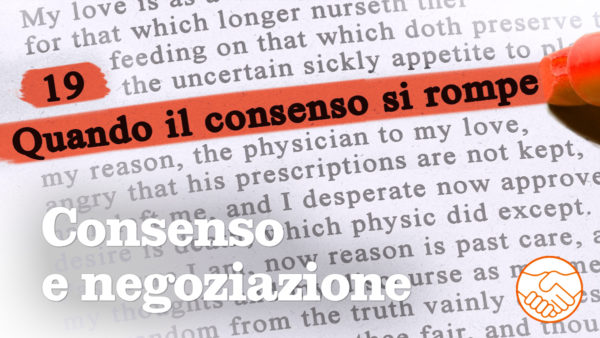18 – Consent

TABLE OF CONTENTS
 CONSENT
CONSENT
I opened these guidelines by talking about consent and now, to conclude after discussing how to manage it through negotiation, I would like to return to this concept and elaborate on it.
As I previously stated, consent is an agreement between two (or more) people based on acknowledgment and respect for their own and others’ wishes.
Sometimes in this agreement it is very easy to find common ground when our desires and limits are similar; other times we need some fine-tuning, and other times yet we may realise that our expectations are incompatible. We can find consent in this case too, however, since although no solution can be reached each partner can still respect the other’s wishes, and this constitutes an agreement. It is better to accept that we cannot play together than to force ourselves into something we really don’t feel like doing.
 Consent must be
Consent must be
- explicit,
- freely given,
- informed,
- specific,
- reversible.
Consent must be clear, explicit, expressed without ambiguity, so that the other person cannot misunderstand it. We must not assume the consent of others as certain unless it was expressed as such. In fact, it may happen that, in the absence of clear information and answers, we project our expectations onto the other person to the point of thinking that “perhaps”, “we’ll see”, “I think so” – or even “no” – may mean “yes”.
Consent must be freely given, i.e. expressed under no pressure. In fact, several elements can influence how our consent is given. First and foremost, we must not be under the influence of substances that may compromise our ability to reason. Additionally, there are explicit or unconscious conditioning factors that may influence our choices, whether dependent on us, the partner, the relationship or the circumstances. We are primarily affected by our character, experience, education and past. We may be conditioned by the belief that we are not good enough, by mood swings, fear of being judged in some way, of displeasing our partner, etc. Then there is the conditioning that may come from the partner, either voluntarily or involuntarily: we may find ourselves consenting to something because the partner is overly insistent or because they make us feel guilty about our possible refusal. Or the conditioning may be of a more hidden nature, due for example to the fact of feeling indebted to a person for some reason, because we are in a situation of work dependence or because we are influenced by a power exchange relationship. Finally, we may also be conditioned by the situation: for example, we may feel obliged to do something because we are being paid to attend an event, a shooting or a performance.
Consent must be informed, i.e. the result of deliberation and aware of what we are going to do, the risks and peculiarities of a certain practice.
Consent must be specific, i.e. it should only cover certain aspects and not be generalised by analogy; for example, consent given for spanking does not authorise the use of a cane. Also, in general, it should only cover one session and not be given implicitly in case we happen to play with the same person again.
Consent must be reversible, at any time, without having to justify why and without being afraid to risk any consequences.
 Finally, consent – unless specific agreements are made – isn’t through a third party. For example, somebody likes to entrust the partner to another person, perhaps to pursue a practice they are not experts in. In such cases it may happen that one partner of the couple negotiates on behalf of the other, especially if there is a domination and submission relationship involved. In my opinion, it is always better to directly address the person we will be playing with, possibly also engaging with their partner.
Finally, consent – unless specific agreements are made – isn’t through a third party. For example, somebody likes to entrust the partner to another person, perhaps to pursue a practice they are not experts in. In such cases it may happen that one partner of the couple negotiates on behalf of the other, especially if there is a domination and submission relationship involved. In my opinion, it is always better to directly address the person we will be playing with, possibly also engaging with their partner.
As we can see, consent requires extreme awareness: often, for various reasons, in everyday life we express ourselves without fully considering the value, meaning and weight of our decisions and it may feel strange or excessive to ask ourselves so many questions, or to go so specifically over certain choices.
We can certainly decide not to set the rules too precisely or to play even when we are not perfectly confident and prepared, but this implies that we have to take responsibility for the fact that not everything could go as we wish.

